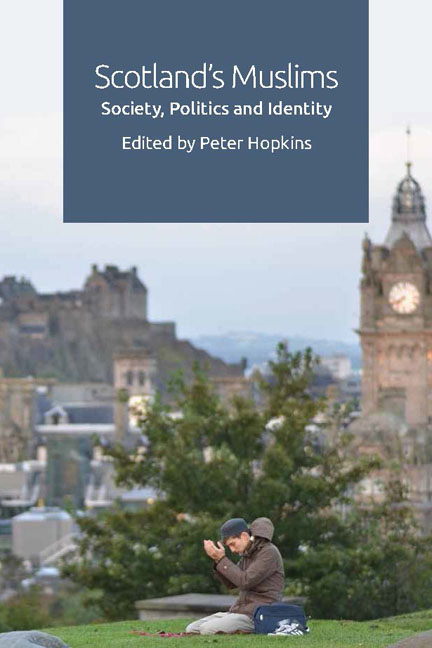Book contents
- Frontmatter
- Contents
- List of Figures and Tables
- Acknowledgements
- Notes on the Contributors
- 1 Introduction Scotland's Muslims: Early Settlement, Current Context and Research Themes
- 2 Health The Health Profile of Muslims in Scotland
- 3 Education Educational Outcomes of Muslim Pupils in Scotland and Parents' Mobilisation of Different Forms of Capital
- 4 Political Participation Young Muslims' Political Interests and Political Participation in Scotland
- 5 Gender and Migration The Role of the ‘Other’ Woman in Shaping the Subjectivities of Recent Muslim Migrant Women to Scotland
- 6 Sexuality Scottish Muslim Gay Men and the Troubling Intersection of Sexuality and Religion
- 7 Young People Muslim Youth in Scotland: Politics, Identity and Multicultural Citizenship
- 8 Generational Relations Gender and Generational Relations for Muslim Women in Scotland
- 9 Heritage Feeling Scottish and Being Muslim: Findings from the Colourful Heritage Project
- 10 Multiculturalism Multiculturalism and Scotland: ‘Bringing the Outside into the Middle’
- 11 Media Muslim Engagement with the Mainstream Media in a Scottish Context
- 12 Representation Representing Islam at the Edinburgh International Book Festival
- 13 Integration Halal Scots: Muslims' Social Integration in Scotland
- Index
4 - Political Participation Young Muslims' Political Interests and Political Participation in Scotland
Published online by Cambridge University Press: 23 June 2018
- Frontmatter
- Contents
- List of Figures and Tables
- Acknowledgements
- Notes on the Contributors
- 1 Introduction Scotland's Muslims: Early Settlement, Current Context and Research Themes
- 2 Health The Health Profile of Muslims in Scotland
- 3 Education Educational Outcomes of Muslim Pupils in Scotland and Parents' Mobilisation of Different Forms of Capital
- 4 Political Participation Young Muslims' Political Interests and Political Participation in Scotland
- 5 Gender and Migration The Role of the ‘Other’ Woman in Shaping the Subjectivities of Recent Muslim Migrant Women to Scotland
- 6 Sexuality Scottish Muslim Gay Men and the Troubling Intersection of Sexuality and Religion
- 7 Young People Muslim Youth in Scotland: Politics, Identity and Multicultural Citizenship
- 8 Generational Relations Gender and Generational Relations for Muslim Women in Scotland
- 9 Heritage Feeling Scottish and Being Muslim: Findings from the Colourful Heritage Project
- 10 Multiculturalism Multiculturalism and Scotland: ‘Bringing the Outside into the Middle’
- 11 Media Muslim Engagement with the Mainstream Media in a Scottish Context
- 12 Representation Representing Islam at the Edinburgh International Book Festival
- 13 Integration Halal Scots: Muslims' Social Integration in Scotland
- Index
Summary
INTRODUCTION
At the time of writing, politics within Scotland and the UK is experiencing a period of uncertainty, with issues such as Brexit, Scottish nationalism, the ‘refugee crisis’ and continued economic insecurity creating a complicated and unprecedented political climate. Scotland, for many, is considered to be expressing a distinctive politics to the rest of the UK (Mooney, 2013; McAngus, 2015), with the Scottish National Party (SNP) having strong representation in both the Scottish and UK Parliaments. With regard to the electorate, there is a sense that young people in Scotland have recently become more politicised (Baxter et al., 2015; Hopkins, 2015), with sixteen- and seventeen-year-olds having been given the right to vote in the Scottish parliamentary elections and the 2014 independence referendum. This contests the frequent narrative that young people are politically apathetic (Kimberlee, 2002), and adds to a growing body of work that seeks to examine and unearth the varied and complex ways in which young people engage with political issues (Brookes and Hodkinson, 2008; O'Toole and Gale, 2013; Pilkington and Pollock, 2015).
As highlighted in the Introduction, the Muslim population in Scotland is growing and 67% are aged thirty-four or under (National Records of Scotland, 2011). Young Muslims in Scotland, then, are an important demographic with regards to political participation. However, apart from the work of Hopkins (2007), there is a dearth of understanding of how young Muslims in Scotland are concerned with political issues (although see Chapter 7). The vast majority of research about Muslim experiences, political participation and racism still focuses on England (Hopkins, 2007). This is especially surprising when you consider that Scotland provides a distinctive political and cultural landscape, and that examining political participation sheds light on pertinent processes with regards to young Muslims, such as integration, belonging and selfdetermination (Anwar, 2015).
This chapter examines the political participation and views of a variety of young Muslims, aged fifteen to twenty-seven, living in Scotland. We examine how different geographical scales impact on the political perceptions, identities and participation of young Muslims. The chapter is firmly grounded in the context of Scotland and examines how its political, social and cultural landscape can engender distinctive perceptions and engagements with political matters. However, we also analyse how the local/national intersects with the global, and examine the influence of international political events on political views and political participation.
- Type
- Chapter
- Information
- Scotland's MuslimsSociety, Politics and Identity, pp. 78 - 97Publisher: Edinburgh University PressPrint publication year: 2017

